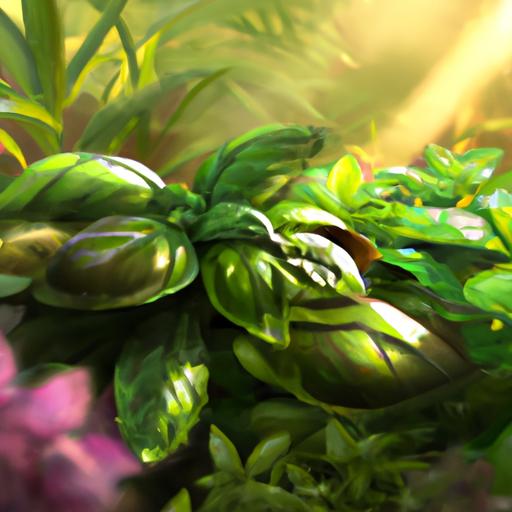Do you want to add some flavor to your garden? Basil is an herb that can add freshness and flavor to your dishes, and it’s easy to grow! But do you know how much sun your basil needs to be healthy and productive? In this article, we’ll discuss why basil needs full sun, how much sun it needs, the best locations for growing basil, and how to maximize sun exposure.
Plus, we’ll look at the benefits of growing basil in full sun and some alternatives if full sun isn’t available.
Let’s dive in and find out what basil needs to thrive!
Table of Contents
Short Answer
Basil is a warm season annual that prefers full sun to partial shade.
It thrives in warm temperatures, so it is best to provide it with at least 6 hours of direct sunlight each day.
If it is consistently exposed to temperatures below 55 degrees, it will struggle to grow and will not produce as much foliage.
With the right environment, basil will provide plenty of flavorful leaves for culinary use.
What is Basil?
Basil is an aromatic herb commonly used in cooking.
It is a member of the mint family and can be found growing in many parts of the world.
Basil has a sweet, slightly spicy flavor that makes it a popular choice for use in salads, soups, sauces, and other dishes.
It is also often used as a garnish for dishes, as its bright green leaves add a touch of color and flavor to any plate.
Basil is easy to grow in most climates, making it a popular choice for gardeners.
However, in order for the plant to thrive, it must have the right amount of sunlight.
Why Does Basil Need Full Sun?

Basil is a warm-weather plant that requires full sun in order to thrive.
Full sun means an area gets at least six hours of direct sunlight per day.
This is essential for basil to produce flavorful and aromatic leaves.
While basil can tolerate some shade, it will not grow as vigorously or produce leaves that are as flavorful.
The reason why basil needs full sun is because it is a photosynthetic plant.
Photosynthesis is the process by which plants use the energy from the sun to perform vital functions such as growth and development.
Without adequate sunlight, basil will be unable to produce enough energy for its needs and will not grow as vigorously or produce flavorful leaves.
Basil also needs ample amounts of sunlight in order to produce essential oils and compounds.
These compounds are responsible for the herbs flavor and aroma.
Without adequate sunlight, the plant will not be able to produce these compounds and will produce leaves that are less flavorful.
Furthermore, basil needs full sun to protect itself from other plants.
Basil is a competitive plant and needs ample amounts of sunlight in order to outcompete other plants in the garden.
Without enough sunlight, it will be easier for other plants to outshine basil and take away its resources.
Finally, basil needs full sun in order to produce a high yield of flavorful leaves.
Basil is a prolific producer of leaves and needs sufficient sunlight in order to reach its full potential.
Without enough sunlight, basil will not be able to produce as many leaves and will not be as flavorful.
In short, basil needs full sun in order to thrive.
It is a photosynthetic plant that needs ample amounts of sunlight in order to perform vital functions such as growth and development.
Furthermore, it needs full sun to produce essential oils and compounds, to protect itself from other plants, and to produce a high yield of flavorful leaves.
How Much Sun Does Basil Need?
Basil is an incredibly popular herb that can be used to add flavor and aroma to many dishes, from Italian pastas to Thai curries.
It is relatively easy to grow, but it does require full sun in order to thrive.
The best spot for basil is an area that gets at least 6 hours of direct sunlight per day.
This will allow the plant to produce the most flavorful and aromatic leaves.
While basil can tolerate some shade, it will not grow as vigorously and the flavor of the leaves will be diminished.
In order to ensure that your basil plants get enough sunlight, you should locate them in a sunny spot in your garden or yard.
If you live in a region with a hot climate, you may want to give your basil some relief from the sun by placing it in a partially shaded area.
But in most cases, basil needs full sun to really thrive.
Additionally, you should make sure that your basil plants receive the right amount of water.
Too much water can lead to root rot, while not enough water can make the plant become wilted and weak.
If youre unsure about how much water your basil needs, its best to consult a local gardening expert or do your own research.
Best Locations for Basil

When it comes to growing basil, you need to make sure that the plant gets the proper amount of sunlight.
While it can tolerate some shade, it needs full sun in order to thrive and produce flavorful and aromatic leaves.
The best spot for basil is an area that gets at least 6 hours of direct sunlight every day.
This will ensure that the plant is getting enough light and can produce the most flavorful and aromatic leaves.
When planting basil, it is important to consider the location of the plant.
For instance, if you are growing basil indoors, make sure to place the pot or container in an area that gets plenty of sunlight.
You can also place the pot near a window to ensure that the plant is getting enough light.
Outdoors, make sure to find an area that gets at least 6 hours of direct sunlight every day.
If possible, try to find an area that gets full sun throughout the day.
This will ensure that the basil is getting the light it needs and can produce the most flavorful and aromatic leaves.
When planting basil, it is also important to consider the temperature.
Basil prefers warmer temperatures, so make sure to find an area that is not too hot or too cold.
You can also use a heat mat to help keep the temperature of the soil warm and consistent.
Finally, make sure to provide your basil with plenty of water.
Basil is a relatively drought-tolerant plant, but it still needs water in order to thrive.
Make sure to water the plant regularly and keep the soil moist, but not soggy.
By taking the time to find the right location and provide your basil with the proper amount of sunlight, water, and temperature, you can ensure that your basil is getting the right conditions to thrive and produce flavorful and aromatic leaves.
How to Maximize Sun Exposure
When it comes to making sure your basil plants get enough sunlight, there are a few tricks you can use to maximize their exposure to sun.
First, try to place your basil in an area that gets the most direct sunlight possible.
This means avoiding areas that are shaded by trees or buildings.
If you live in a particularly sunny area, you can also try using a reflective material such as aluminum foil to direct more light towards the plants.
Additionally, if you live in an area with shorter days, you may want to consider using grow lights to supplement the natural sunlight.
Grow lights can help your plants get the extra light they need to thrive.
Finally, if youre planting multiple basil plants, make sure to space them out as much as possible to ensure each one gets the sunlight it needs.
With the right amount of sun, your basil will be well on its way to becoming a delicious addition to your meals.
Benefits of Growing Basil in Full Sun

Growing basil in full sun has many benefits.
The plant will grow more vigorously and produce larger leaves with more intense flavor and aroma when given the right amount of sunlight.
The leaves of the plant will be much more flavorful and aromatic than when grown in partial shade or indoors.
Full sun also helps to ensure a larger yield of basil, allowing you to have plenty of the herb for cooking and preserving.
Additionally, since the plant will be exposed to more direct sunlight, it will be less susceptible to pests and diseases.
This will ensure that your basil crop remains healthy and productive.
Alternatives to Full Sun
When it comes to growing basil, full sun is the best option for producing the most flavorful and aromatic leaves.
However, not everyone has the luxury of a sunny spot in their garden or yard.
Fortunately, there are some alternatives to full sun that can still yield satisfactory results.
Partial sun is one option for growing basil.
This means that the plant is exposed to at least 4-6 hours of direct sunlight per day, but it can also receive some shade during the day.
This type of environment is good for basil, as it will still be able to produce flavorful leaves, but the plant may not be as vigorous or produce as many leaves as it would in full sun.
If you don’t have access to any direct sunlight, you can still grow basil indoors.
While it won’t be as flavorful as the basil grown in full sun, it will still be delicious.
To achieve the best results, you should place your basil near a window that gets at least 6 hours of direct sunlight per day.
You can also supplement the light with artificial grow lights and fluorescent lamps.
Finally, it’s important to note that basil is a relatively hardy plant and can tolerate some shade.
If you don’t have access to direct sunlight, you can still grow basil in a shadier spot.
However, the plant won’t be as vigorous and the flavor of the leaves will be diminished.
In conclusion, full sun is the ideal environment for growing basil, as it will produce the most flavorful and aromatic leaves.
However, if you don’t have access to full sun, there are alternatives such as partial sun and indoor growing that can still yield satisfactory results.
With the right amount of sunlight, basil can be a delicious addition to many dishes.
Final Thoughts
Basil is an easy-to-grow herb that can add flavor and aroma to any dish.
By understanding what it needs to thrive, you can ensure your basil plant gets the optimal experience.
With the right amount of full sun, your basil will produce the most flavorful and aromatic leaves.
By finding the best spot in your garden or yard to maximize sun exposure, you can ensure your basil is growing to its fullest potential.
Now that you know why basil needs full sun and what the optimal conditions are, you can get started growing your own delicious basil!

